Get posts by email
As I drag myself out of the woods
October 1, 2020
This is a long post, maybe the length of a chapter in a book. I recommend reading it when you have some time to process and digest. It's the story of my experience, my state of mind and state of heart, as we end our homeschool journey during a global pandemic in a time of heightened awareness and activism around racial inequality.
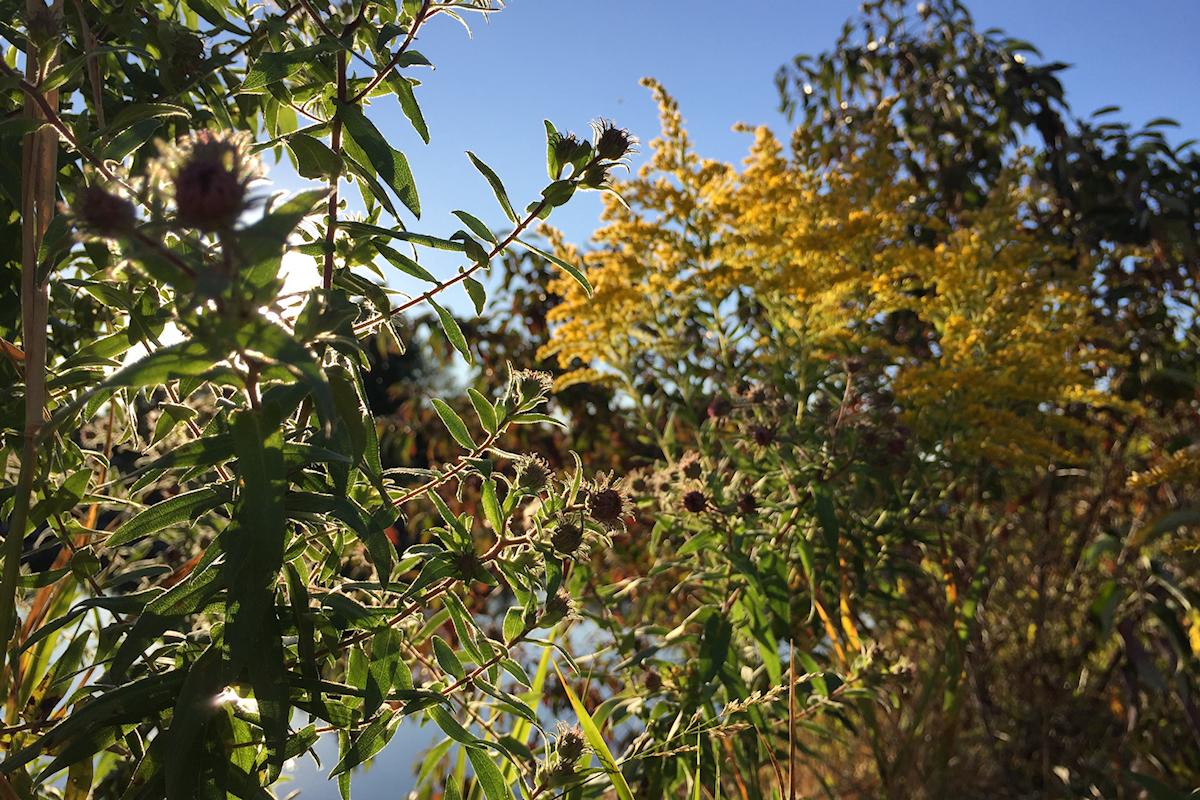
Here's a linked table of contents with the main ideas. All these things flow together in the story telling but you can also jump around, and skip ahead, as you like.
That time I tried to organize a hiking day
After I thought I might never hike again
The realities of homeschooling in Quebec
And then there was a pandemic, and I learned a lot of things
Don't believe everything you read
How we gain compassion (hint: we have to suffer ourselves)
What it's like to end a long hike
Last summer I tried to organize a women's hiking day.
I am that "hiking/outdoorsy" person in my social circles and I'd like to share my love for the outdoors and help people discover good hiking trails in my area.
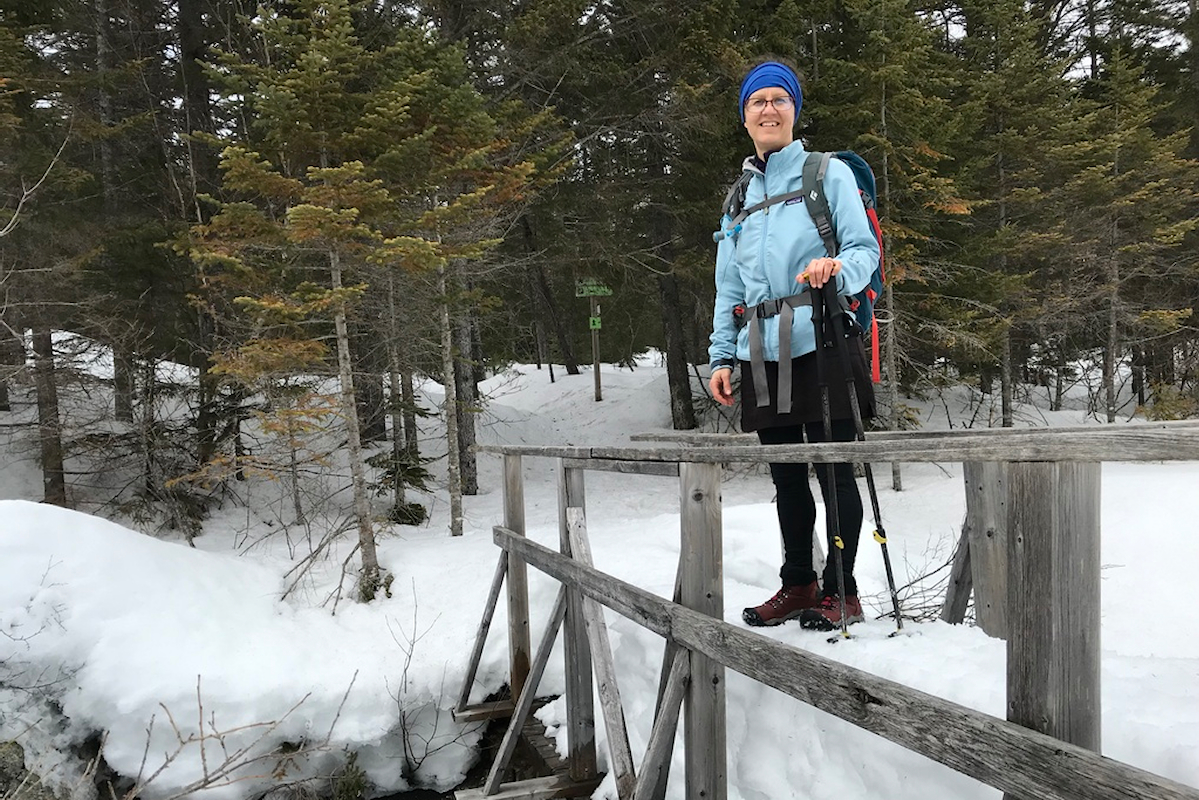
To be honest, I find the the hiking in the Montreal area very lackluster after years of hiking the Western Mountains of Maine, the Whites of New Hampshire, the Green Mountains of Vermont, and the length of the whole Appalachian range from Georgia to New England.
But most of my friends are beginners and the Laurentian trails, north of Montreal, are perfect for their experience and fitness level.
For a couple years now I've been wanting to be with friends in the outdoors and to contribute to my community this way. It's something I know how to do, how to plan for, and I know where to go.
I was gung-ho so I set a date, made a car-pooling plan, and chose a hike that would be easy for beginners but also reward us with a view. I had thought of everything. Except for the bugs.
Truly terrible black fly season was not something I had to accommodate for in my New England or Gaspesie hiking days because the mountains are higher and the trails took us above tree line where the wind took care of the bugs.
As soon as mud season ended, or was almost dried up, sometime in May, we'd hit the trails and wouldn't stop till November.
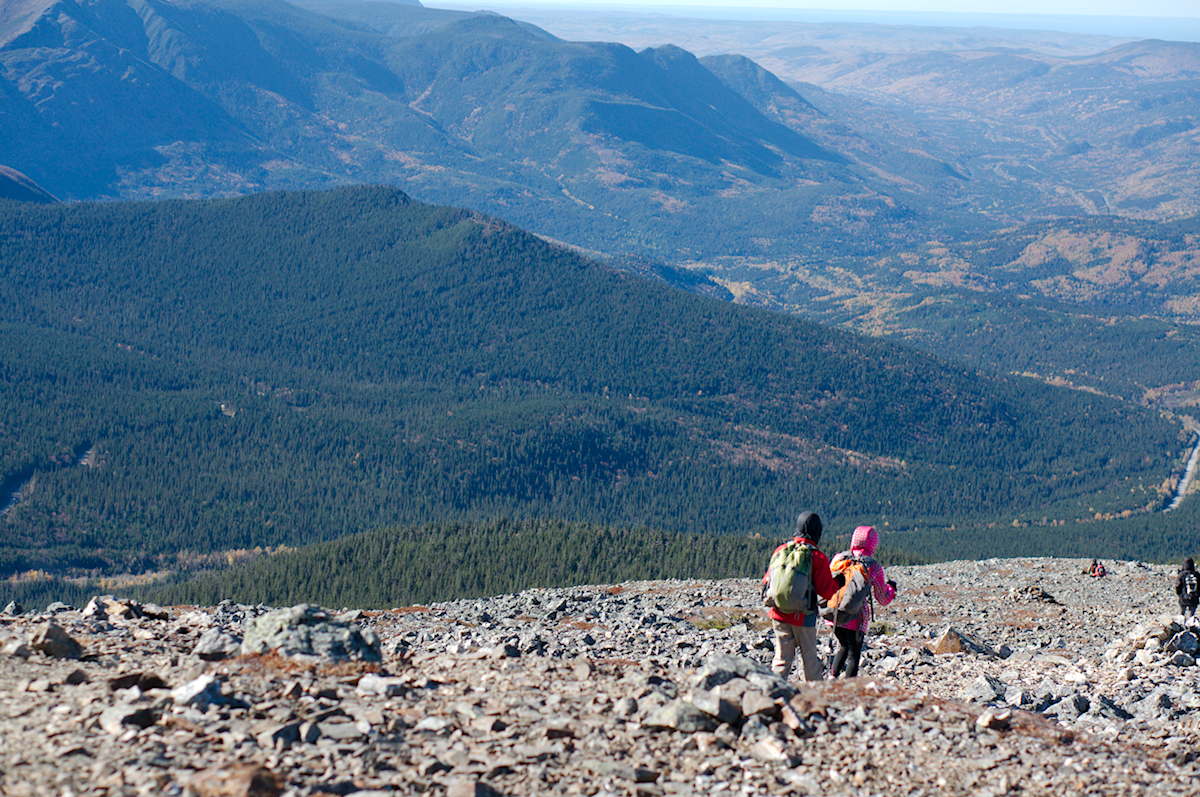
So I wasn't really prepared for the black fly season in the mountains close to Montreal.
It took us a couple years, and a series of frustrating hikes and camping trips, to figure out that from early June until late July the rewards of hiking in the Laurentians were not worth the sacrifice of human flesh to the black fly gods of these ancient and worn down mountains.
Last year on a bug-infested camping trip in early June, my husband and I finally conceded to the "the way things are" in these parts. We'll do other activities during the height of bug season. Flies 1, Humans 0.
I called off the hike that I had scheduled with my girlfriends. I didn't want to subject myself to the torture, never mind a group of women who I was acclimatizing to a day of walking in the woods.
I had hoped to organize another day after bug season, but it never happened as my summer gained speed and my weekends filled with family activities, travel, and my own more rigorous hiking adventures for which I wasn't willing to bring newbies along.
This summer we bought a canoe and started paddling. And there was also a little inconvenience called the pandemic which complicated all aspects of life, and organizing a day of hiking for women just never happened. But I hope to return to this idea because being out in the woods and climbing to the top of a mountain is one of my favorite things to do.
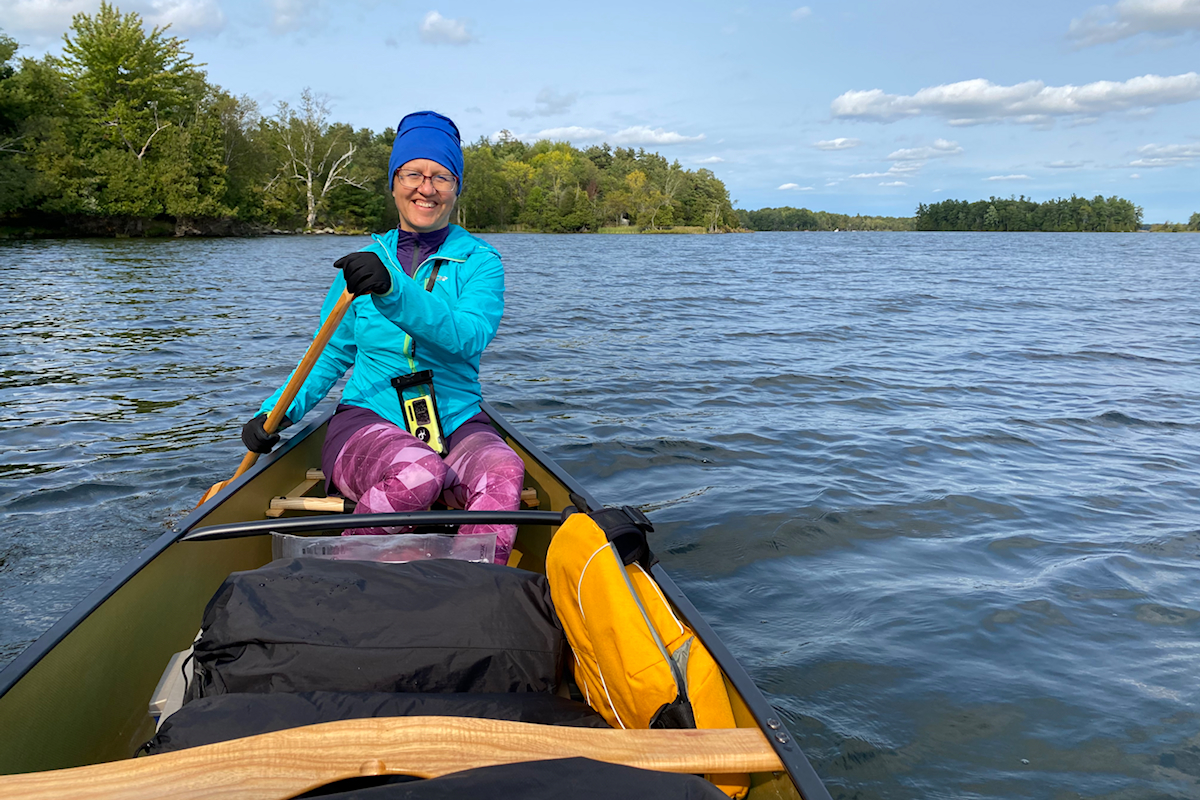
Six years ago, in the aftermath of my family's Appalachian Trail thru-hike, I thought I'd lost my love for hiking.
For one thing, I ended that hike with a stress fracture. I couldn't bear weight and walk on my foot. Hiking had broken me physically. But my thru-hike attempt had also broken me mentally and emotionally. Never before in my life had I done something so hard, for such a sustained period of time.
The story of our hike has been told in other places so I won't repeat it here, except to say, the hike was life-changing for me personally, for our marriage, and our family life. The emotional and mental breakdown I experienced set the stage for one of the biggest pivots in my adult life and marriage, which was the deconstructing and eventual reimagining of my faith and spirituality.
What came out of that experience has been good but going through it was really rough.
When we got off the trail I told Damien I might never backback again and that even hiking was off the table for a long time.
I was exhausted. I was very angry (about many things). I was disappointed. I had regrets. I was so sad. This was the first real "breaking" in my life. I had never experienced physical or emotional pain like this before. And that it happened in the context of one of my most intimate relationships while fulfilling one of our lifetime dreams, was incredibly disorientating.
To protect myself from more pain, I put up boundaries all over the place of what I would and wouldn't do, what I could and couldn't give.
I had given everything to that endeavour and I was completely spent. The next couple years were focused on healing and getting our family established in a community in Montreal, where we moved ten months after we finished our AT hike.
I returned to hiking a couple years after the AT but it took a bit longer before I was ready to backpack again. On a two week section-hike of Vermont's Long Trail with my parents, the joy in long distance hiking returned. Sure, it was tough some days, hiking always is, but something changed in my spirit. I finished that trip wanting to do many more like it.
My love for long days in the woods, climbing up and down mountains, was back. I had re-discovered something I thought I might have lost forever after my Appalachian Trail hike.
I discovered that doing this activity on my own terms without deadlines and hyper attention to mileage markers (something we had to do in order to complete our thru-hike in the time frame we had), without pounding the miles, with a "let's see where this takes us and let's enjoy the journey there" was the way I wanted to backpack.
I remembered what had drawn me to backpacking and hiking in the first place - the beauty, the sense of open adventure, sleeping in the woods, summiting mountains, quality time with people I love, and the desire to have new experiences everyday.
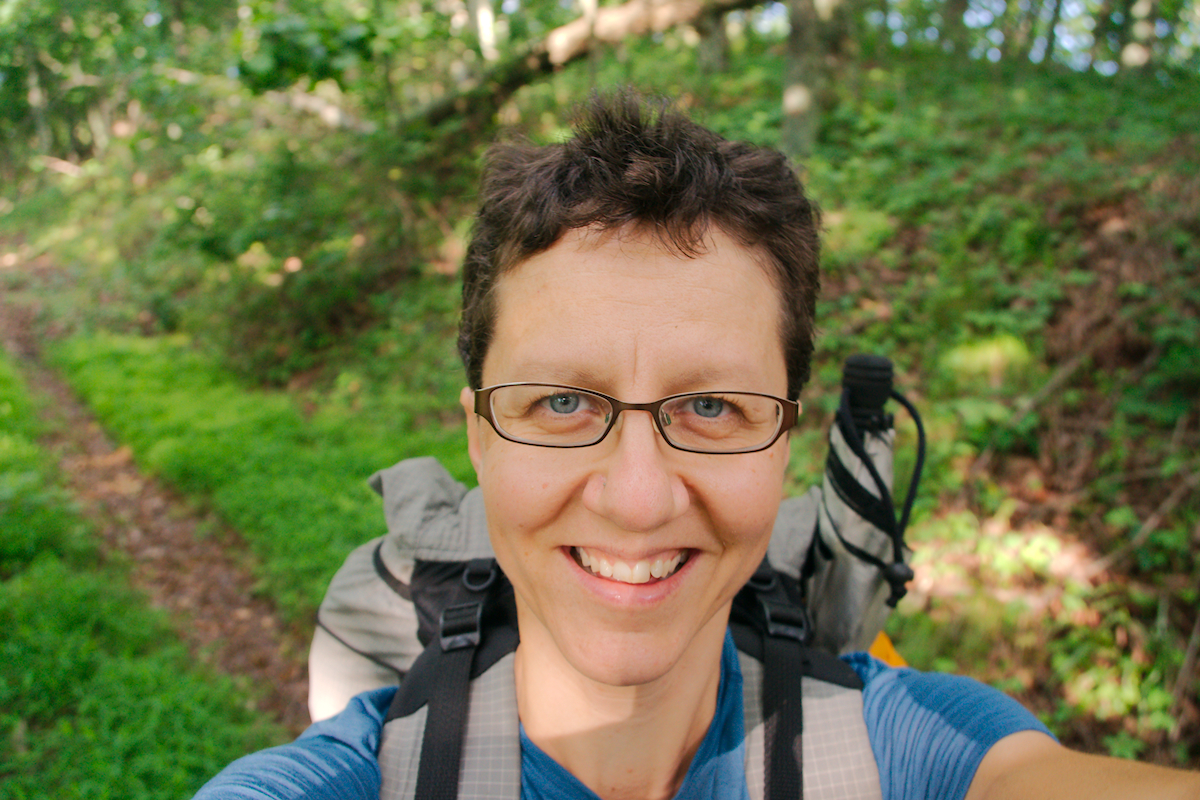
somewhere on the AT, summer 2014
My exit this summer from homeschooling reminds me of the period that followed our AT thru-hike. Exhaustion, anger, cynicism, disappointment, regrets, and sadness at the end of long journey.
We officially finished homeschooling this summer when our youngest daughter started college (physically distanced, online) at the end of August. Three kids, all the way through, done.
Homeschooling was a grand adventure and I started with incredible enthusiasm.
It felt like I was hop, skipping, and jumping down a wooded hiking path with my children, metaphorically but also quite literally. We did a lot of hiking together when the kids were younger.
I was confident and full of energy as we blazed our own trail through through the woods. I was never a scout-leader but that's how I felt as an early homeschooler; arms swinging, singing a jaunty hiking tune as I led my happy and innocent charges onto new discoveries and learning, bright red handkerchief nattily knotted at my neck. (For 10 points name that literary device. You can take the mom out of the homeschool, but you can't take the homeschool out of the mom.)
Homeschooling was natural and fun for me. Eleven years ago I even gave a talk at my local library with that very title.
When we started, our destination way, way off in the distance was young adulthood. We were hiking our way there, to the borderlands between childhood and adulthood. When we tried to get a view of this land from one of the many summits of childhood it was too far off to see clearly, even from a mountain-top vantage point.
But we knew where we were headed, and by golly, we were going to have a good time getting here. We were going to walk as fast or slow as we liked. We were going to linger by streams and camp in meadows along the way. We were going to take side trails and find cool hidden treasures in the woods that few others would discover because most of our contemporaries were taking the paved route provided by compulsory and conventional schooling.
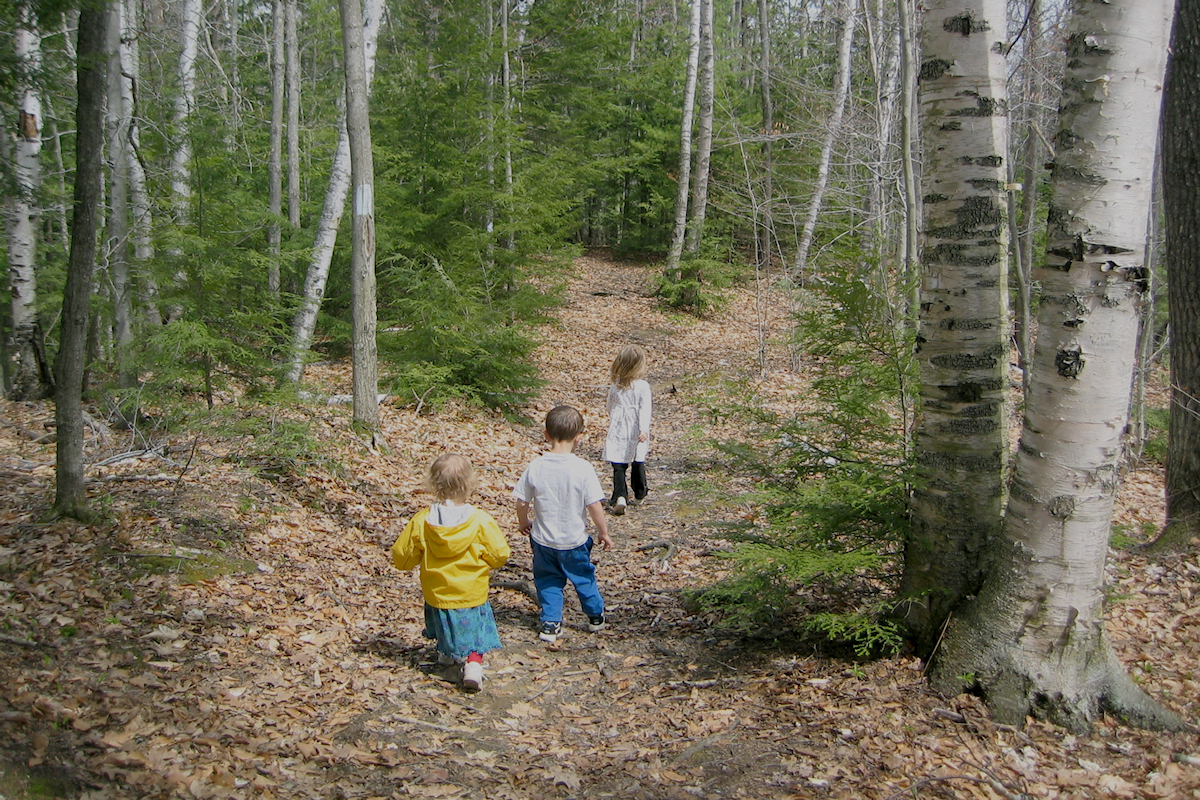
I was full of energy and enthusiasm. And when my energy flagged I had conviction, ideals, and dreams to keep me going, until I caught a fresh wind.
Fast forward to present.
As I ended this long hike I was no longer swinging my arms and singing a song. Like I told one of my best friends, who is also homeschooling through high school, I couldn't swing my arms anymore because I was using them to pull myself out of the woods as I belly crawled the last miles of the journey.
I lost my nattily knotted red handkerchief a few years ago, sometime mid-high school years. And I stopped singing as the elevation became more challenging and I needed to focus all my energy on breathing and watching my footing on the tricky path.
Having helped three kids find their own way through the woods for their high school education, they have all jaunted past me into the land of young adulthood, forging their own paths now.
And while they have gone on ahead of me, I am just emerging from the woods. I have bug bites and scratches from all the underbrush. My knees are killing me, crawling on them will do that. And I am very tired.
Years of trail blazing has left me fatigued.
There's so much to process this year, as the pandemic crashes into (and crushes, to some extent) family life at this very important juncture where all the kids have now crossed into young adulthood.
The pandemic has dampened life on so many fronts. There is loss and grief. The flood of emotions during this season has been intense.
In my emotional vulnerability, I have doubted everything we've done. I've regretted the things we didn't do. I have questioned big life decisions, including homeschooling.
I've been sad and unmoored. And I think I've already mentioned once or twice, so tired. This reminds me of how I felt after the Appalachian Trail.
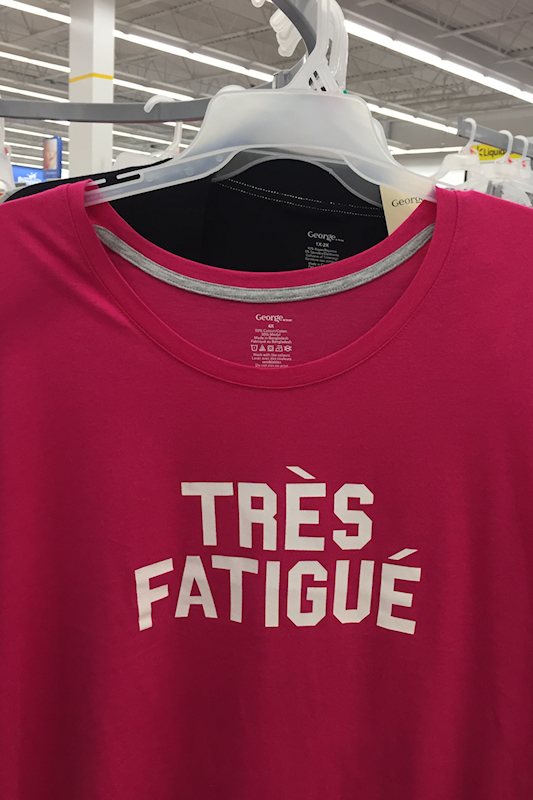
as seen in walmart, summer 2020
"Maybe this is just how you finish", Damien says.
"You gave this everything you had, like you do about the things you care about, and you probably just need time to rest before you feel a bounce in your step again."
Ok, so he didn't say the "bounce in your step" part. I said that. But I took to heart what he said about how I gave so much of myself - willingly and with intention - to raise our children.
Regardless of your educational philosophy and particular methodologies, you have to give a lot, relationally especially, to homeschool over the long haul.
Parenting is hard work whatever path you choose and homeschooling adds additional layers of connection with your kids (yay!) and responsibility for your kids (not so yay). Especially when you choose alternative high school education. All of which has required me to grow and give in ways that have really stretched me.
Heads up, as your tour guide on this hike through my personal experience, I have to warn you we're about to wade into a thicket called "the craziness that is homeschooling in Quebec". You can skip down a little further, or walk with me through it.
Homeschooling through high school was always going to be hard work but living in Quebec has amplified the difficulty.
Life is hard work. Choose your hard. But when government heavy-handedness and bureaucracy complicates life unnecessarily... Oh, that makes my blood boil.
One of the most challenging homeschool tasks of the last couple years has been the hoop jumping and box checking required to get Brienne into the college system here in Quebec. Which is the equivalent of community college but is harder than university, in terms of entrance logistics, for homeschoolers to enter. Go figure. That's Quebec for you.
In the last couple years Quebec has changed the homeschool laws and regulations and the upside of this is that it will probably be easier for future homeschool grads to enter the "community" college system (called CEGEP). Homeschoolers will also have an easier path for obtaining Quebec ministry of education high school diplomas and transcripts. Something our kids don't have. All of this is good news for current and future Quebec homeschoolers.
The downside of all of this, and it's a significant downside, is that the current regulations require biannual reporting to the ministry of education, oversight by ministry officials (regular check-ins), and mandatory ministry-issued standardized exams in pre-determined grades. It's these exams, at the high school level, which will get you the diploma. We would have considered this option for our kids, had it been available, but it wasn't possible or feasible for our family because the law changed just as our kids were finishing high school.
We had to use a work-around to get Brienne into college and our oldest kids met the admission requirements of their respective institutions (a public, comprehensive research university; and a private, media-orientated career college) without official high school diplomas. (They have transcripts and extensive portfolios of their four years of high school education, ages 14 - 18, which I created.)
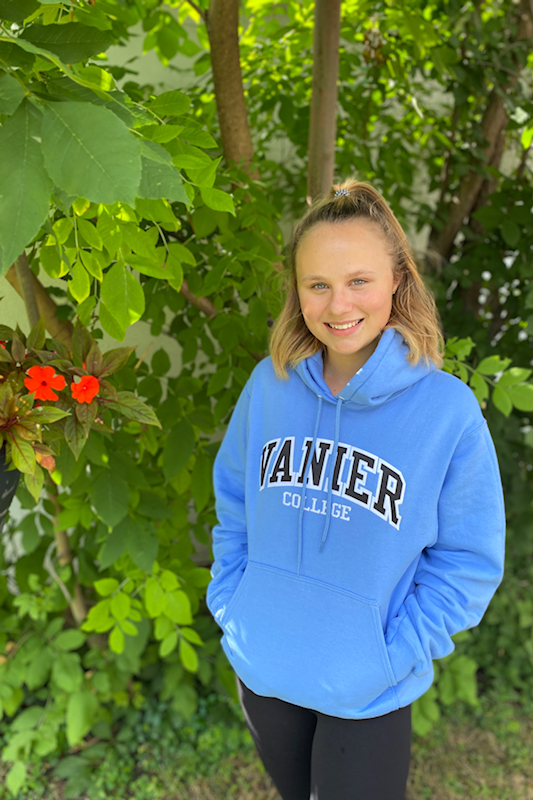
The effect of these regulations in Quebec has been to change the tenor of homeschooling at the family and community level. For homeschool communities, organizations, co-ops, and groups, the last couple years have been all about, first, fighting the regulations, and then after losing that battle, figuring out how to adapt to what has become, perhaps the most regulated, and yet resource-unsupported, homeschool environment in all of North America.
Families get very little curricular support and even less ($0) financial help for their child's education for doing all this hoop-jumping, box-checking, and curriculum teaching, just so their kids can meet ministry standards. Many families pay certified teachers out-of-pocket to sign-off on their kids' learning portfolios to meet government regulations. This is on top of paying for all their own learning resources and materials.
The amount of extra mental, emotional, and financial labor this has introduced into the lives of homeschooling families, most of whom have been doing an excellent job without such heavy-handed government oversight, is not insignificant. As a group we're tired. And personally, I'm pissed.
And then the pandemic started.
The remote learning that schools instituted in spring with lockdown was a joke. You know that when the school system says "grades don't matter" they're losing their shit. The public system is not set up to teach children remotely. Many families were stretched beyond their limits to provide child care and education while working from home (if they were lucky) or while working in essential services outside the home.
Prior to the pandemic, I had no idea how crucial schools are for the running of the economy.
As a working-at-home, homeschool family, I have lived my adult life in a bubble of home as the primary place of industry, productivity, education, sanctuary, and care. Home is the center is my reality.
Turns out I am very sheltered. And privileged. (To be clear, we have made a lot of financial sacrifices to create this reality, but still I'm absolutely privileged.)
My life is so far from the norm. And I didn't realize the extent of that, until this pandemic.
Schools exist as much to provide child care, so the capitalist engine of growth and production can keep grinding on, as they do to educate children. It's debatable which is more important to society and governments.
This is the context in which families found themselves forced into homeschooling in the spring. This is not homeschooling, this is large-scale crisis management.
Even though I am "officially" done homeschooling (spoiler alert: there's no pension when you retire) I keep in the loop of the local scene on Facebook groups, etc. Once a homeschooler, always a homeschooler.
The local support groups were inundated this summer with newbie homeschool parents who are not homeschoolers by philosophy or choice, but are coming into homeschooling because it's the only option they have to keep their kids home for individual or family health and safety reasons, in a province that is only offering remote-learning options to a small group of medically-exempt students.
This is an incredibly anxious time for families.
If you were to believe everything you read it's absolutely critical for children's social and academic development to be in school.
The dominant message from media this summer was that kids are deprived if they are not in schools. (N.B. don't believe everything you read.)
Children from abusive and extremely economically disadvantaged homes aside, this idea is false.
Yes, many children's needs are met in compulsory and conventional schooling. And I must admit that prior to this pandemic I was unaware of how deep the socio-economic needs are in many communities and the crucial role of schools in meeting very physical needs like food and shelter. But this is a societal problem that schools are addressing, not an education problem.
One has to ask if there aren't other ways that these deep inequities can be addressed in a manner that empowers families and communities, instead of adding more responsibility, and power, to overly-centralized institutions.
What's also really clear, because of the pandemic, is that schooling meets society's need for childcare to keep parents working in a growth economy, while simultaneously educating future workers (& consumers) for that unsustainable economy. But is compulsory school, as we know it, "necessary" outside of its role in keeping this system going, to meet the needs of children?
Absolutely not. Here's a counterpoint from a Dr. Gordon Neufeld, clinical psychologist and foremost authority on child development, and not a biased homeschool parent like myself.
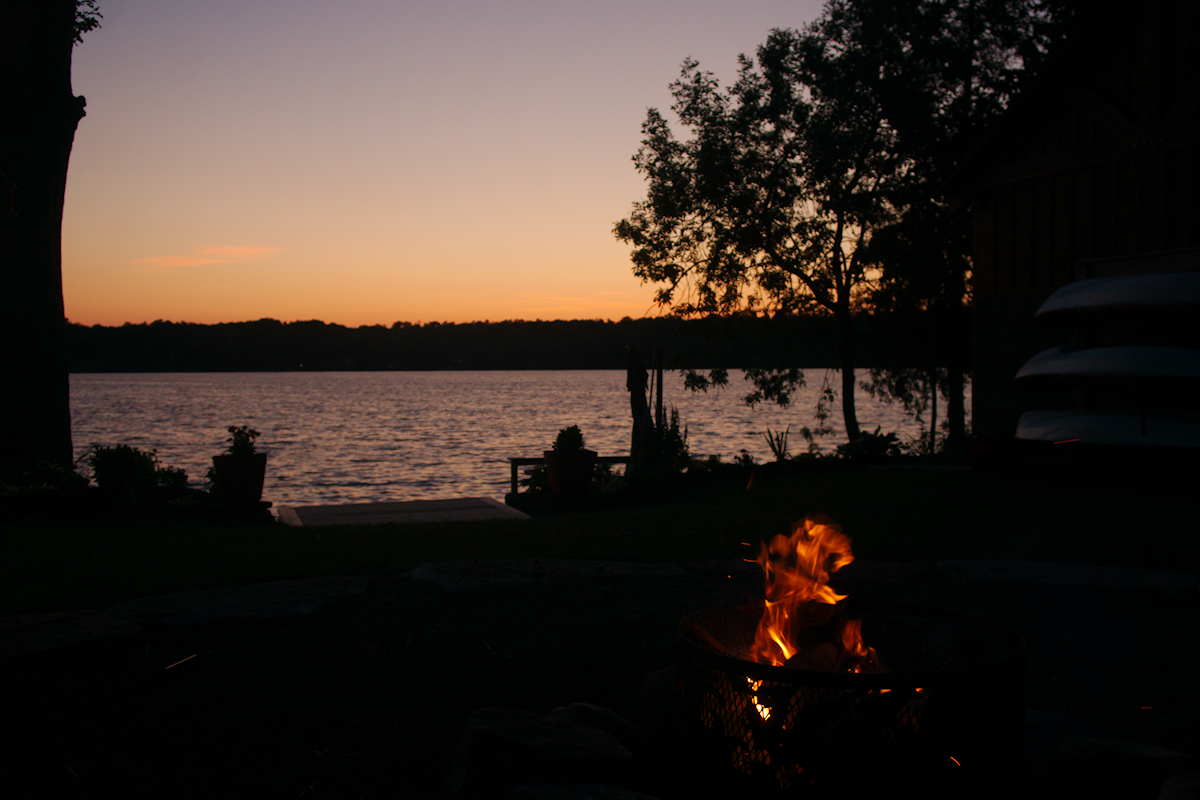
Conventional public schooling provides crucial and necessary support for families in raising and educating children - physical, social, intellectual, etc. But it's not necessary where families and communities provide that themselves for their children.
Homeschoolers have been demonstrating this for decades.
The bias, fear, misinformation, and downright lack of imagination - that has been heightened by the pandemic - on the subject of children's "need" for school, and the misunderstanding of what homeschooling actually is, wore me down this summer. Yes, children have many needs. And as a society we've grown to depend on schools to provide those. But schools are not the only avenue for those needs to be met.
And I haven't even touched on all the ways that compulsory school attendance, mandatory same-age social grouping, peer-dominant influence, lack of individual child autonomy and choice, and the over-scheduling of family life can have negative impacts on children, families, and communities.
There has been an influx of interest in homeschooling in this province but not because people are wanting a family-focused and individualized education for their child. It's not because they are imagining a different and expanded possibility for their family life and their children's growth and development.
No, they are turning to homeschooling because they are terrified of sending their kids to school. All the while, they are wondering how they can meet the government regulations and teach the standard curriculum.
After years of relying on and trusting in the system to provide for their children's education, you can't blame parents for thinking the ministry of education and school boards know what's best for their individual child. Even though the government's refusal to let parents decide to keep their children home during the pandemic, and provide the necessary support in doing so, should indicate just how much big bureaucracy cares about individual families and students. Hint: not very much.
Fear, anxiety, disappointment, loss and grief, with a hefty dose of skepticism and PTS from the springtime experiment in forced remote "learning" are the dominant emotions in the outer rings of the expanding homeschool circle.

This is the landscape I find myself in after crawling out of my own homeschool experience, spent from the effort of the journey.
I've been feeling like a real curmudgeon over here. Beyond my normal skepticism and questioning, the exhaustion of my own journey (in parenting and homeschooling) has left me vulnerable to cynicism. Which has been unfortunate because I care deeply about home education. But for me it's not just about home. Home has been the place I can practice and cultivate a core value - freedom. The freedom of families. The freedom of individuals. For me, it's not about home education as much as Freedom Education.
I think what grieves me most is that so many people live in boxes of their own making, or boxes constructed by society for them, so they don't even know they have a choice. They have no freedom.
This summer showed me how privileged my position is regarding choice and the pursuit of education freedom for my children's growing years.
I have always felt I've had a choice in how to raise and educate my kids without fully realizing how much of that confidence is because our color, ethnicity, socio-economic status plants us firmly in the dominant culture. (One caveat: we are part of the linguistic minority of anglophones living in Quebec and this disadvantages our family in some ways, but within the larger North American context it does not.)
I see the world through a specific lens and I've been wondering how much of that perspective is because I was born into a class and color that allowed me the freedom to pursue a different viewpoint.
I haven't been afraid to step outside the capitalistic growth-economy metrics that are used to evaluate children's progress and "success". I haven't been afraid to teach my kids the value of cooperation, compassion, and collaboration over competition, or the value of character over percentage grades. (Interestingly, our kids still care a lot about their grades, because competition is part of our DNA, just like compassion. Affirmation by the group is as hard-wired as contributing to the group.)
Is the reason I haven't taught them to fight their way to the top because I'm secure that they already hold that position as white, settler descendants?
I ask myself, how much would I be willing to live my values of educational freedom if I was an immigrant who felt the need to assimilate into Canadian culture? If I was a person of color being judged, even unconsciously, for my skin tone, or my children being judged by theirs? Would I have been willing to take the risks I've taken in raising my kids outside the expectations of compulsory education?
Privilege is swimming in water where current works to your advantage. And you don't have to be aware of it, you often aren't, in order to enjoy the benefits.
As I've taken some time this late summer to reflect on my privilege and also the education and years of experience I've had to arrive at my values and beliefs, I have a little more patience for all the parents freaking out about how this pandemic is ruining their children's education.
I acknowledge the pandemic is ruining things for people. It's negatively affecting my life and the lives of my young adult children quite significantly. But education is way bigger than schooling, and that's the part that most people don't recognize in their narrow view of "how things are done".
Who am I to judge these parents who are wringing their hands about box-checking and hoop jumping?
The truth is, these past couple years I've been doing much of the same. And that fear and preoccupation, along with the natural separation and differentiation of young adults from their parents, has absolutely quenched the freedom fire in my belly.
I'm exhausted from the rigamarole of the last couple years. Some of which was simply inevitable with the educational path we chose for our children, who never tracked with the school system or took standardized tests. At some point we were going to have to prove their progress to institutions, if they were going to pursue post-secondary, which all our children are doing.
I expected that. But the changes to homeschooling in Quebec and the general current government attitude towards home education unnecessarily complicated that process.
On top of all that our kids are doing what young adults do - separating from their parents, questioning their childhood and the values with which they were raised, cutting the apron strings to grow into their own adulthood.
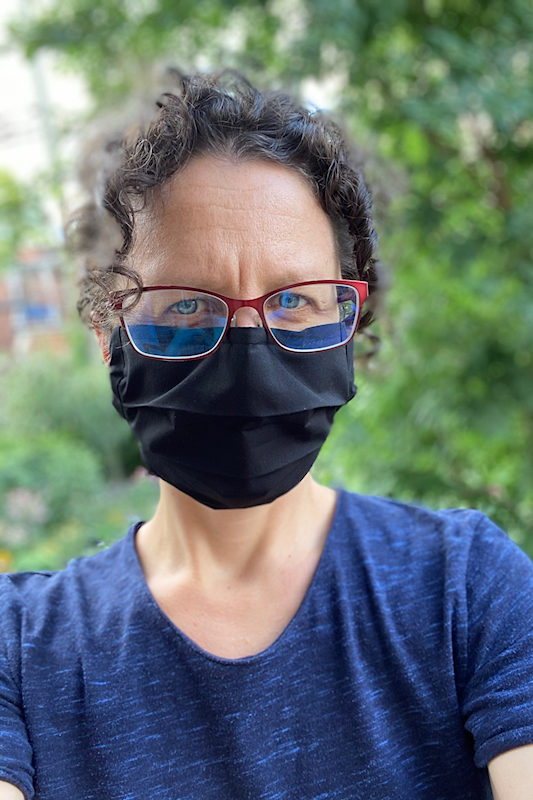
I'm crawling out of the woods because the last few years have been hard. Hard in a way that parenting teens and young adults is, for the reasons listed above, but also hard as I was running the finishing homeschool gauntlet. Everything I loved about the early years, but mostly the freedom to do as we wished, was gone. Instead there were deadlines, hyper-attention to records of achievement, and lots of paperwork.
This was no longer a meandering "let's see where this takes us and let's enjoy the journey there". We were running the rapids at the end of the river and it required vigilance and attention.
This must be somewhat similar to what all these stressed-out parents feel about their children's pandemic educations, exhausted by the viligence and attention needed to shoot the rapids, to get it right.
I understand this at the later high school level when you have to prove post-secondary or work/career readiness. There's a lot of responsibility in these years. But it saddens and frustrates me that parents of young children, children who should spend most of their day playing, feel this way. It saddens me that parents are so stressed about their young children's academic progress, that they not fall behind.
But when you're in the system it's so important to not fall behind. And as this pandemic has taught me so clearly, people depend on the school system managing their children's education so they can work and put food on the table. Dependance is real and necessary for many families. It's a dependency baked into our society.
No wonder parents (and kids) are scared and disappointed.
I have stepped back from the crazy that is the homeschool environment in my province right now. I'm technically done homeschooling so I'm naturally moving away from the buzz of activity. But I'm also distancing myself similarly to how I distanced myself from hiking for a few years after our Appalachian Trail adventure.
I have a lot of offer the homeschool community but I don't want to be so cynical about the close-mindedness and the stay-in-the-box mentality of the worried, anxious, and reluctant newcomers to the fold. I need some rest first, so I can face all that anxiety with open-heartedness, hope, and creativity.
The system wore me down and I was only involved with it, peripherally, for a couple years.
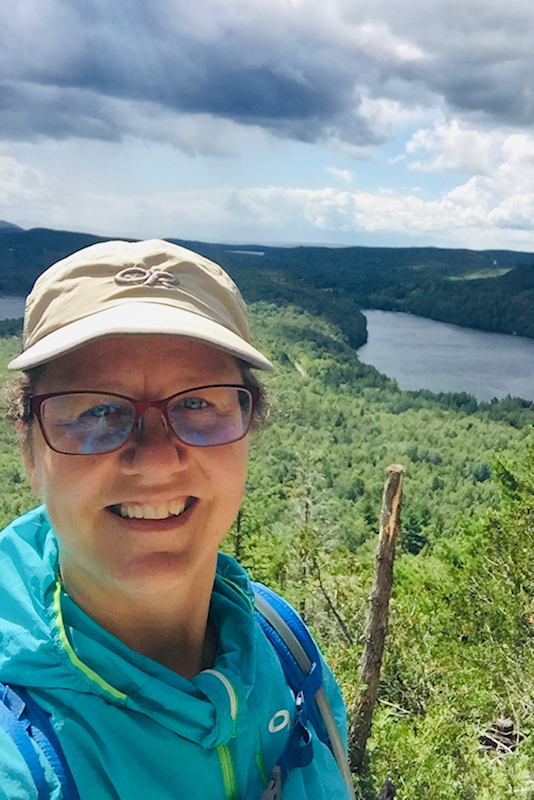
What it's like to end a long journey
When you go hiking, for one day, or many days, you always come down the mountain when you're done. You don't end with the satisfaction of the summit, you end with the satisfaction of the entire journey, up and down.
On shorter, less challenging hikes you end with energy left in the tank but on long and difficult hikes you end tired, sometimes bone tired. If you got caught in the rain you might be soaked through, or maybe parched if you didn't pack enough water.
You might have strained or pulled a muscle that is giving you persistent pain on your decent. If the hike is particularly steep your knees might be killing you on the way down. Your recovery time will depend on the intensity and length of the journey, and the conditions you experienced along the way.
Tired and sore is how you end the most epic adventures.
But you do recover, eventually. You just need to give yourself time to heal, time to rest.
And then you can get back into the fray of things. You can go hiking again and help others who want to come along. As long as it's not bug-season.
Filed Under
Resource Library
You can subscribe to comments on this article using this form.
If you have already commented on this article, you do not need to do this, as you were automatically subscribed.





